Have you ever thought about eating your green tea leaves? I’ve been drinking tea for years, decades even. But to eat it? What about those luscious green tea leaves? Ever eat them? Is there a benefit to eating a green tea leaf? What a terrible idea, or is it? People bake with tea and tea leaves. Maybe there is something to it, you know…Eating green tea leaves instead of brewing them.
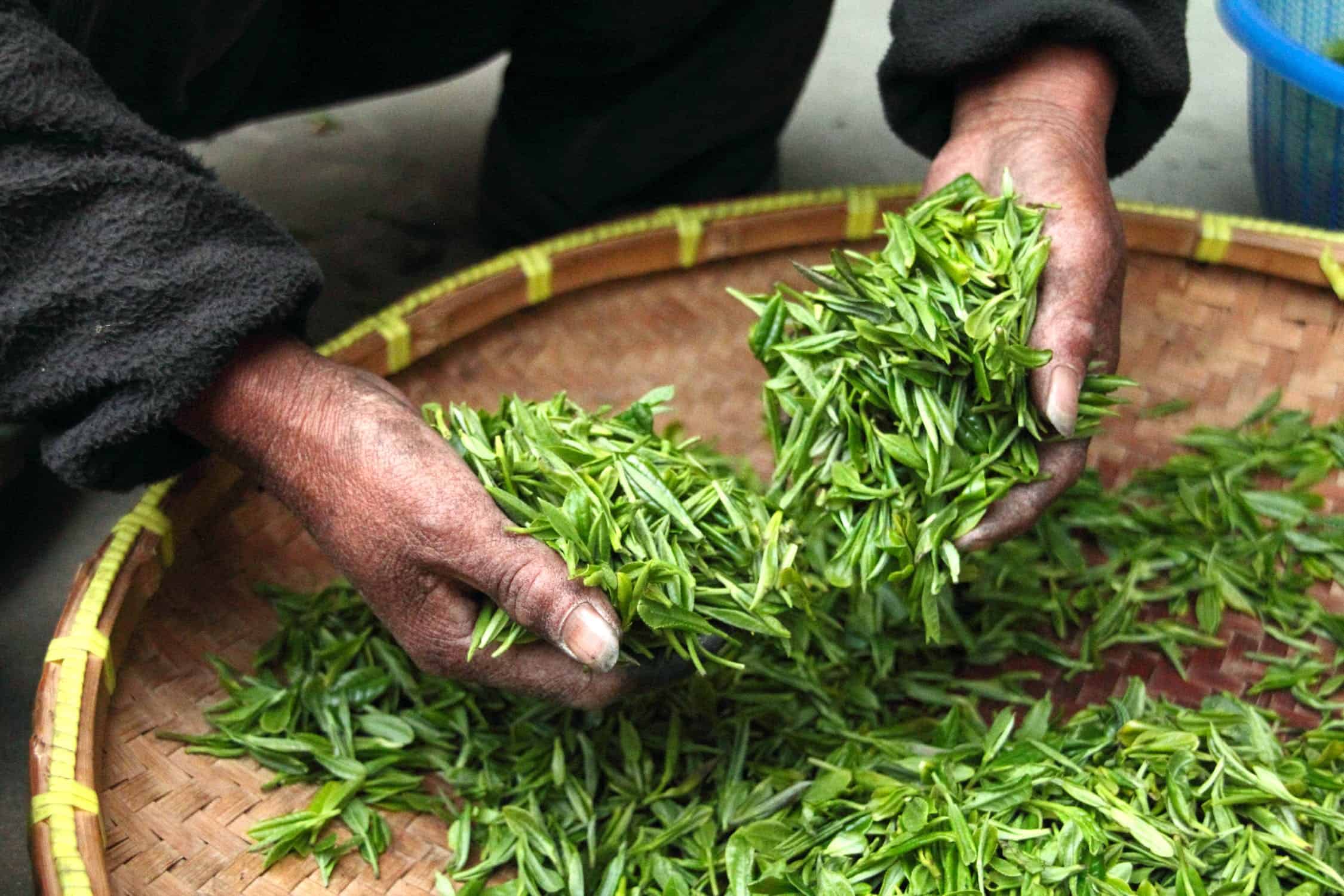
The inhabitants of Myanmar eat green tea leaves
It’s definitely not the normal thing to do.
Inhabitants of Myanmar formerly known as Burma eat green tea leaves. It is an essential popular dish for traditional ceremonies. Tea leaves are consumed daily and can be found in marketplaces everywhere. Laphet is most often found in a salad.
The original taste of tea leaf is bitter. The bitterness is reduced after the fermentation process.
Myanmar has a popular expression: “Of all the fruit, mango is the best; of all the meats, pork is the best; of all the leaves, laphet is the best.”
Matcha is tea leaves that have been powdered, you add water and you drink it without reservation. Basically, you are drinking tea leaves. The leaves however are still infused in the water and you are not consuming just the tea leaf, but a brewed tea leaf.
Many people bake beautiful desserts with matcha like:
- Cakes
- Ice Cream
- Candy
- Cookies
- Cream
- Doughnuts
- Bagels
- Cheesecakes
Matcha would not taste good if eaten by teaspoons of powdered tea. I’ve not tried it, not sure I’d want to. It’s a pretty fine powder. It would be a challenge to get it swallowed I am certain.
We are talking about eating green tea leaves prior to brewing. The taste will be different. The taste will be somewhat of eating grass, straw, hay, or like that. The taste we receive from green tea leaves being brewed is so much different. The brewed tea is more palatable. Brewing tea draws out the flavors from the leaf.
So, chewing on a raw tea leaf will be a far different experience. Can it be beneficial? There are two thoughts on the topic and we will discuss both.
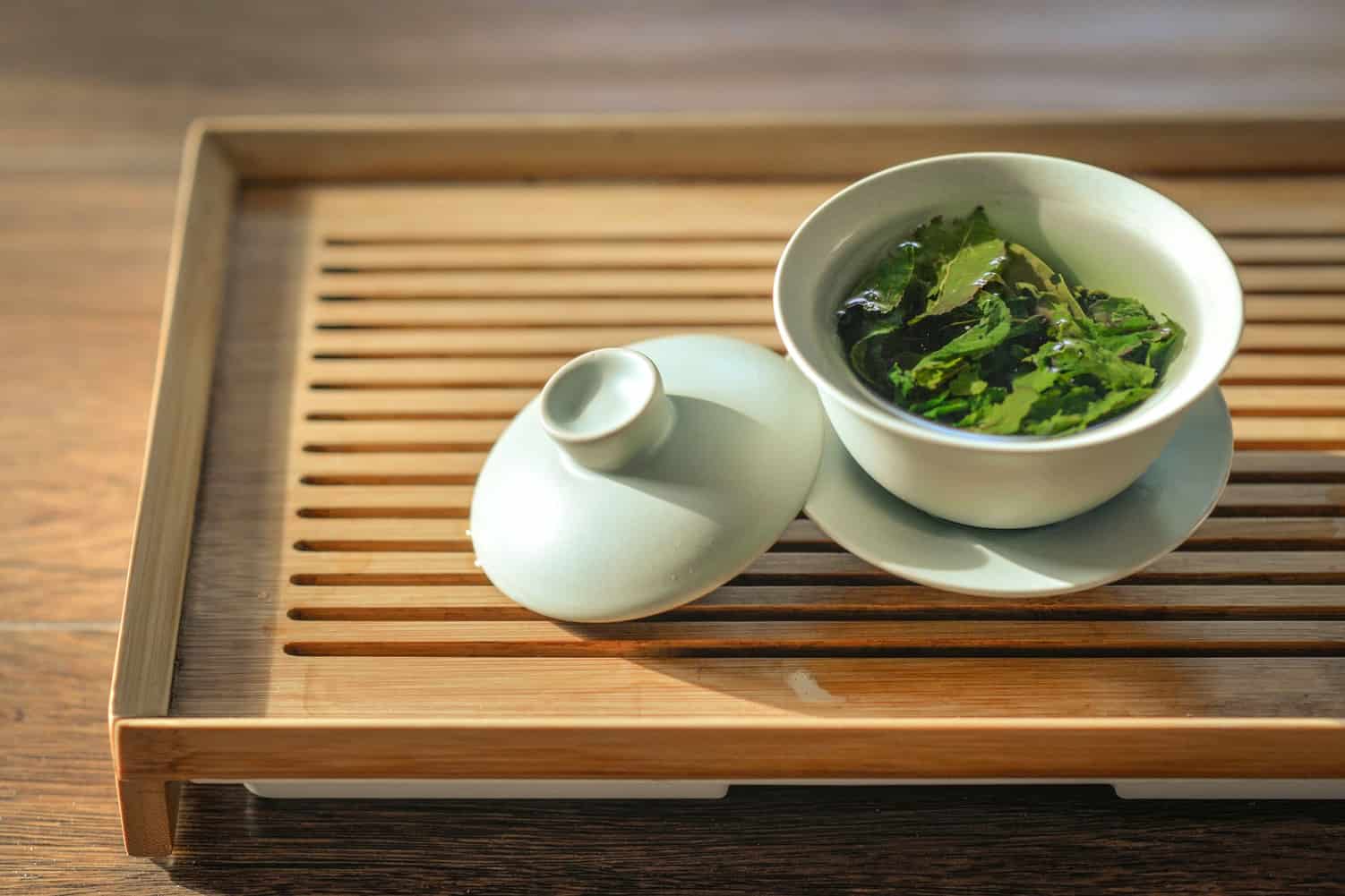
The Yay’s (yes you can eat green leaves)
I had to do a little bit of research on this subject. It’s easy to find information on brewed tea. But finding healthy benefits of eating green tea or any tea leaves proved to be a bit harder than I planned on.
From what I have found, eating tea leaves is shown to be higher in antioxidants than brewed tea.
Do you find this surprising? I did at first.
But, if you think about it. Eating a raw vegetable gives you a higher percentage of healthy beneficial ingredients. If you steam or cook the vegetable. That makes sense.
So it makes sense that eating a tea leaf prior to it being steamed or even brewed has a higher intensity of benefits. The source of the raw tea leaves carries a greater health potential than tea leaves prepared.
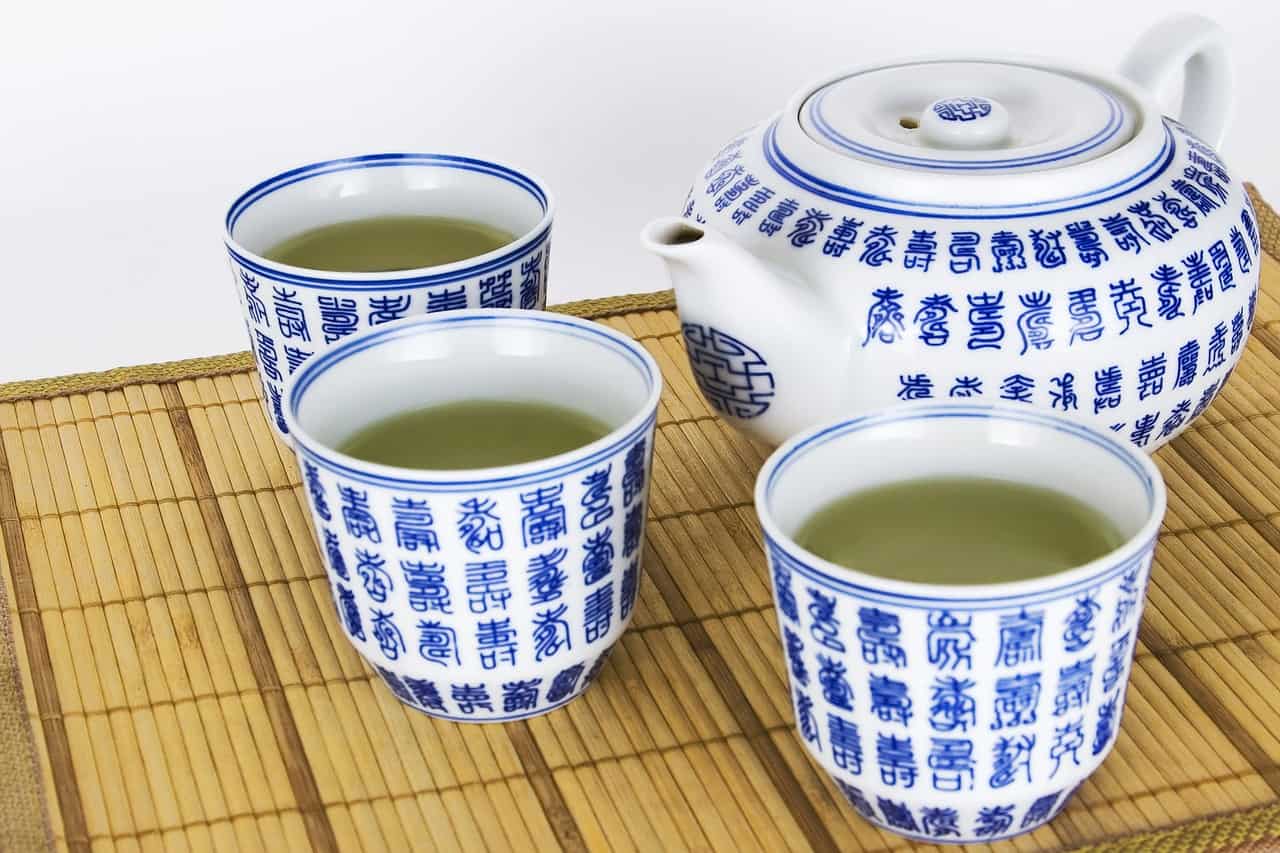
The Nay’s (no-no-no)
Now here is the counterpart of the argument. Some tea specialty people believe that eating a tea leaf will not harm you and you will get benefit from it. There are some health benefits and nutrition. You will only get those benefits from brewing the tea leaf and consuming it as a tea.
There are also concerns about eating tea leaves that contain heavy metal contaminants. I would have thought they would be passed unto the brewed tea but according to this study and over 30 tea samples that were tested 18 contained mercury but not in the brewed samples of those teas. It seems that these metals stuck to the tea leaves and were not released once being brewed.
The study goes on to show the metal content that is steeped into the brewed tea and compared to what is in the tea leaf before brewing.
So, it seems tea leaves do carry more contaminants than brewed tea.
If you’d rather drink your tea leaves here are a few suggestions
Gokyuzyo translates literally to "The Highest Grade" in Japanese. One of the best green teas from a favorite in my cup.
Bancha is a very popular type of green tea in Japan. It is lower in caffeine than other types and has a nut-like flavor to it.
The steaming process creates a difference in the flavor between Chinese and Japanese green tea
- 16 oz. loose whole leaf herbal tea.
- Brew 150+ cups per bag! We recommend 2-3 grams of tea per 6oz of water.
- 100% organic tea, direct from our single garden in Bangladesh
- Caffeine content: About 1/4 the amount of caffeine as a cup of coffee.
Benefits of tea
The benefits of tea are wide and strong. Tea is more than just a soothing beverage. Tea is a powerhouse. Just to name a few of the health benefits of tea:
Black tea is known to:
- Reduce the risk of a stroke
- Lower blood sugar
- Fight bad LDL
- Improve your microbiome
- Create alertness
- Increased metabolism
- Improve mental health
- White tea is known to
- High in antioxidants
- Helps fight teeth bacteria
- Slows aging in skin
- Reduce Heart disease
- May fight cancer
- Fight osteoporosis
- Healthy hair
- Green tea is known to
- Lowering the risk of heart disease
- May increase your metabolism
- Balancing of cholesterol
- Protect the brain against Alzheimer’s
- Protection against Parkinson’s
- Balance blood sugar
- The fluoride may help strengthen teeth
There are so many more. You will notice as you get into studying tea that many of the health benefits cross the line of all the teas. That is because the teas all come from one place: Camellia Sinensis”. One plant, many teas.
I’ve written on the topic many times and you can find that information on the following links.
So, who’s correct?

Cautions
I believe the things I would caution you about with eating green tea or any tea leaves would be the same things I would caution you about drinking tea.
Tea bagged tea – Most teas bagged tea contains fathoms or tiny pieces of teas. Sometimes the tea is so small it will fall through an infuser. Eating that tea would be interesting and messy. A lot of those teas are highly fermented as well.
Organic – Or at least non – GMO. It’s so important to know that the tea you use is non-toxic. In all things, you should do your best to drink tea that has no “crap” in it.
Flavors – This is a huge issue with me. Do not put an ingredient in my tea (or food) that you cannot label. I get that some want to keep an ingredient “hidden” so as not to be copied. For me, I can’t consume a product that says “flavors”. What am I consuming? I want to know what I am eating so, avoid tea with “added flavors”
Conclusion
As a person who reviews teas on a regular basis, I can say I’ve tasted many green tea leaves. I don’t have a favorite. I do it to really get a taste of the tea. I think it’s something to do in moderation. Eating green tea leaves is not a side dish. But it is interesting to taste the tea leaf that’s been prepared for your cup. It’s an experience if you are up to it.

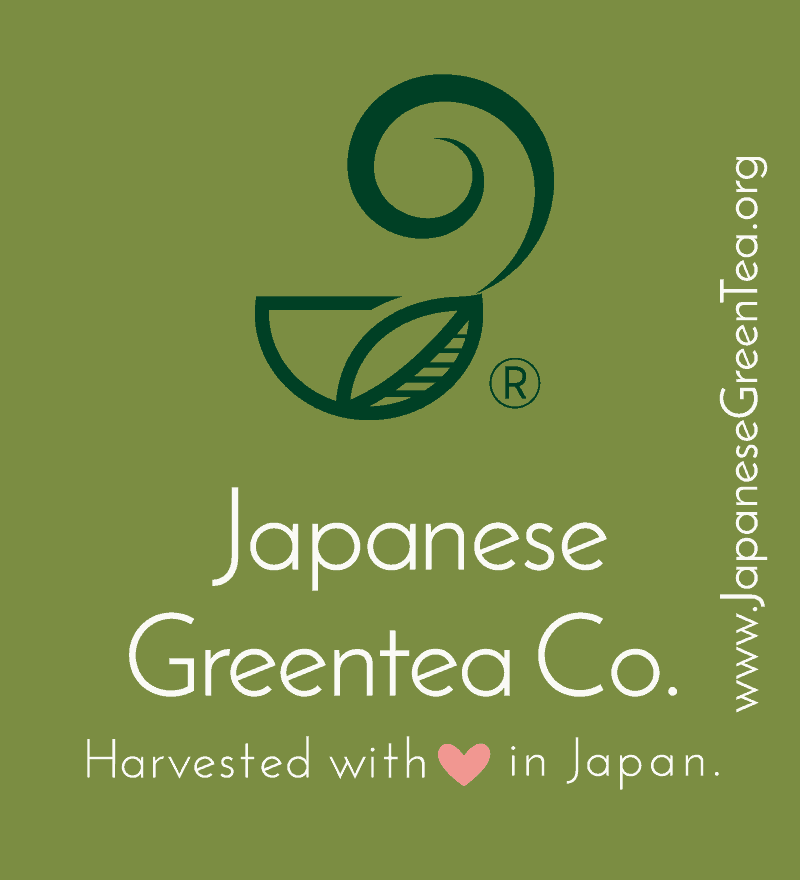
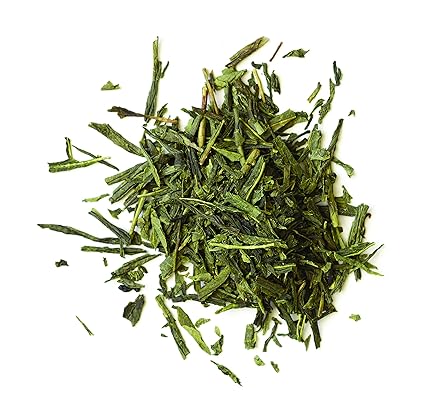
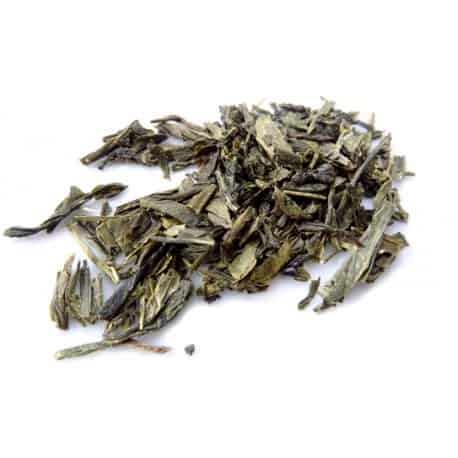
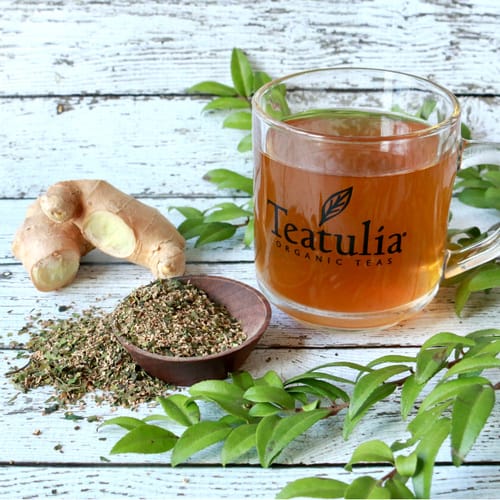


6 thoughts on “Is There A Benefit To Eating Green Tea Leaves”
First time I tried it, I had green tea that I finished brewing and then added some ponzu sauce and sprinkled sesame seeds over it. It turned out to be a nice little appetizer and, bonus, was able to enjoy both eating and drinking my tea.
Green tea is not my number 1, but I’ve had some amazing green teas from China that were amazing. A lot of things I find here in the states are blah and very very vegetal, I can’t enjoy that.
Yes this is true for tea here. I had some straight from Japan to drink and eat, but mostly to drink.
The link is fixed, btw.. Now you can read all about “me” and my tea beginnings. Let me know what you think. I love feedback!
Hi Lisa,
That is a lovely story of your grandmother. It is similar to the connection I had with my grandfather and baseball. I’m glad I found your site. I’ll check out your other posts and keep on learning. Thank you.
Pat, hello and thank you for being here! I’d love to hear about your tea connection.